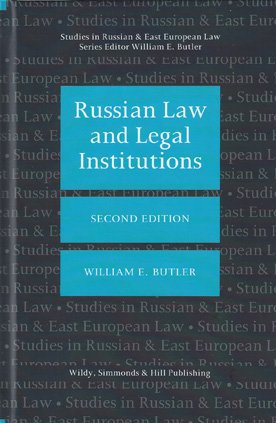This latest book in the series provides twelve country studies, excluding the Baltic republics, setting out the basic legal regime regulating the participation of foreign juridical persons and individual entrepreneurs in legal proceedings before arbitrazh or economic courts (depending on the jurisdiction concerned). Reference is made in each country to general jurisdiction retorsions, exclusive jurisdiction, contractual jurisdiction, location of defendant, procedural capacity, and, with respect to the recognition and enforcement of foreign judicial decisions, to reciprocity, procedure for recognition and enforcement, refusal to recognize and enforce, public policy, and foreign judicial decisions not requiring enforcement.
The volume is accompanied by translations of major regional multilateral and bilateral agreements (Kiev, Minsk, Moscow, Kishiniv agreements and others).
Contents:PrefaceAbbreviations;THE RUSSIAN LEGAL SYSTEM IN CONTEXT1. RUSSIAN LAW IN COMPARATIVE LEGAL STUDIES;Teaching and Research on Russian Law;Comparative Law in Russia;Socio-Legal Research in Russia and Comparative Law;2. RUSSIAN LAW AND LEGAL TRANSLATIONOn the Roles of Language;Translation Conundrums;Translation Due Diligence;Official, State, and Authentic Language Texts;Translation and Proof of Foreign LawThe Fiction of EquivalenceLanguage-Parity;Translation Liability;THE FOUNDATIONS OF RUSSIAN LAW3. ??? PRE-REVOLUTIONARY HERITAGE;Kievan Rus;Mongol Subjugation 1240-1480Muscovite Law 1480-1648;The Russian Empire 1649-1917;Continuity, Change, and Continuity;4. RUSSIAN LEGAL THEORY;Russian Jurisprudential Roots;Legal Doctrines of the XI-XIV Centuries;Legal Theory and Romanov Absolutism 1613-1800;Legal and Political Theory 1800-1850;The Golden Age 1850-1900;The Twilight Years 1900-1917;Russian Legal Theorists in Emigration;The Soviet Marxian Legacy;Post -Soviet Legal Theory;5. SOURCES OF LAW;Jus [?????];Soviet Law;Legislation;Constitution of Russian FederationTreaties of the Federation;Judicial and Arbitration Practice;Conceptions and Strategies;CustomsNormative Acts of Non-State Entities;“Soft Law” Recommendatory International Acts;Acts of the Union State;Documents of the Commonwealth of Independent States;International Law;Doctrine;Publication and Entry into Force of Legislation;Access to Judicial Practice;6. LEGAL PROFESSION AND LEGAL EDUCATION;Origins of Legal Representation;Precursors of the Russian Legal ProfessionThe Advokat;Current Legislation;The Jurisconsult;Foreign Jurists in Russia;Legal Education;Legal Research;Legal Publishing;THE ADMINISTRATION OF RUSSIAN LEGALITY7. THE ADMINISTRATION OF LEGALITY;Ministries of Justice;Judicial System;Constitutional Court of Russian Federation;Courts of General Jurisdiction of the Russian Federation;Military Courts;Justices of the Peace;Arbitrazh Courts;Other Tribunals;Procuracy;Notariat;Registry for Acts of Civil Status (ZAGS);Administrative Commissions;Law Enforcement Agencies;Preliminary Investigation Agencies;Arbitration;Role of Non-State Entities;Law Enforcement Coordination in the CIS;THE STATE STRUCTURE OF RUSSIA8. CONSTITUTIONAL LAWConcept of FederationismSubjects of the Federation;Electoral System;The Presidency;The Federal Assembly;The Government;Local Self-Government;Constitutional Amendments;Political Parties;Social Chamber of Russian Federation;REFERENCE MATERIALS ON RUSSIAN LAW9. FURTHER READING;Documents and Dictionaries;Looseleaf Service;Legal History and Theory;Post-Soviet Russian Law;Comparative Law;International Law;ANNEX: CONSTITUTION OF THE RUSSIAN FEDERATIONSection One;Section Two




